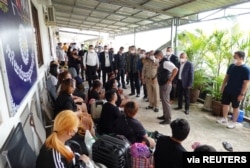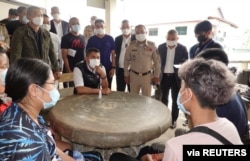PHNOM PENH / WASHINGTON — After months of mounting reports of workers from across Asia being trafficked into Chinese cybercrime rings operating in Cambodia, the government finally conceded last week that a more aggressive approach to the problem was in order.
Interior Minister Sar Kheng said on August 22 that officials were being deployed across the country to check hotels, casinos and other establishments for potential trafficking victims, and that some suspected traffickers had already been arrested in the sweeps.
Sar Kheng’s comments came shortly after Taiwan complained that more than 300 of its nationals were being held captive in Cambodia after being lured into supposedly high-paying tech jobs, only to end up at call centers seeking to defraud Chinese targets.
But that was just the latest missive from foreign governments raising concern about their citizens being trapped in Chinese-run scams based in Cambodia.
Indonesia requested a meeting over its citizens being trafficked into Cambodia on the sidelines of the ASEAN Summit in early August, and then announced last week that it had repatriated 241 Indonesians trafficked by online scammers, and blocked another 214 potential victims from traveling to Cambodia.
Since the start of August, the Philippines urged Cambodian authorities to rescue four nationals being held in a casino complex in Koh Kong province. More than 40 Vietnamese nationals escaped from a casino in Kandal province and swam across the Binh Di River into Vietnam. And Hong Kong officials said 10 of its citizens were still stuck in Cambodia.
Cambodia’s Foreign Affairs Ministry spokesman Chum Sounry said in the last six months, it has received requests for intervention in forced labor cases from at least nine embassies, including Bangladesh, India, Indonesia, Malaysia, Mongolia, Nepal, Pakistan, the Philippines and Thailand.
And the Interior Ministry said about 900 foreign citizens have been rescued from trafficking rings so far this year.
Cambodia has long had a problem with its own citizens being trafficked into slave-like conditions in nearby countries like Thailand and Indonesia. But working to stamp out foreign-run trafficking rings within its border is a new phenomenon, and Phnom Penh’s ability to disrupt the criminal networks could have wide reaching consequences for its economy and regional standing, experts told VOA Khmer.
Jason Tower, the Burma country director for the United States Institute of Peace, said Chinese criminal networks have expanded their footprints in relatively lawless pockets of Southeast Asia in recent years, including Cambodia, northern Myanmar and Laos.
A crackdown on online gambling in China pushed many nefarious actors out of China and into relatively unregulated areas of Southeast Asia, he said, and then COVID-19 suddenly halted the flow of labor, tourists and gamblers from China, forcing what were effectively organized crime rings to seek other sources of income.
In Cambodia, Hun Sen’s government announced its own ban on online gambling operations in 2019, forcing some Chinese investors in the sector to come up with alternate business plans.
Chinese embassies across the region began reporting an uptick in kidnappings of Chinese nationals early in the pandemic, Tower said, soon followed by reports of trafficking, abuse and enslavement of victims from countries across the region.
“As the pandemic went along, more and more evidence that this is really a regional crisis came to light,” Tower said, “that this was a very much the…work of transnational criminal groups who are trafficking people across borders, holding them in these zones in slave like labor conditions and forcing them either to perpetrate scams or to pay up in large amounts of money to secure their freedom.”
News outlets including Al Jazeera have detailed horrific abuse being perpetrated by Chinese captors in Cambodia, from brutal beatings to terrorizing victims with tasers and electric batons and sexually assaulting trafficked women. Victims are often held in heavily guarded compounds with razor wires or bars to keep people from coming or going.
And those being trafficked are often fairly well-educated, as the scams they are being forced to carry out generally require good language skills — often Chinese — and the ability to follow scripts used to dupe unexpecting victims on the other end of the scam.
The scams being carried out range from “pig butchering,” in which a mark is wooed into a romantic relationship to share bank details; seeking investors in fraudulent schemes; selling membership to fake sex clubs and posing as government officials to request unpaid fees or fines.
Confronted with evidence of the trafficking rings operating in Cambodia, ruling party officials have generally denied that it’s a widespread problem, and even accused the alleged victims of lying in order to break their employment obligations.
While it’s unclear how much Sar Kheng’s speech last week will disrupt the illegal operations, it’s at least a sign that Cambodia is responding to the mounting concern from its neighbors, unlike nearby Myanmar, where the problem is even worse and the junta is both complicit, and unwilling to confront it, said Tower.
“It does seem that following a bit of international pressure, that you're starting now to see Cambodian authorities come out of it at least saying ‘yeah, look, we're doing some things. We're taking some steps to address this,’” he said.
Cambodia has already faced global fallout from its failure to confront new trends in human trafficking.
Cambodia was downgraded to Tier 3 in the U.S. State Department’s latest Trafficking in Persons report, meaning the government does not meet minimum standards in its efforts to combat human trafficking and “are not making significant efforts to do so.”
“Authorities did not investigate or hold criminally accountable any officials involved in the large majority of credible reports of complicity, in particular with unscrupulous business owners who subjected thousands of men, women, and children throughout the country to human trafficking in entertainment establishments, brick kilns, and online scam operations,” the report said.
According to Al Jazeera’s reporting, in the case of Chinese online scamming rings, those official connections reach high up in the ruling party, with some of the tycoons linked to the facilities housing the illegal operations linked to a nephew and advisor of Prime Minister Hun Sen.
And despite some of the Chinese investors behind these facilities being convicted of financial crimes in China, they have been welcomed to do business in Cambodia.
Chou Bun Eng, a senior Interior Ministry official who heads Cambodia’s National Committee for Counter-Trafficking, did not respond to a request for comment for this story. She previously told VOA Khmer that while individuals rescued in Cambodia were “victims of online deception…we can’t say all the cases are human trafficking related.”
She told the South China Morning Post that “Cambodia is the victim country” regarding the Chinese syndicates.
“These are foreigners using our territory to commit crimes against other foreigners. We do not have the capacity to respond to every report of crime, but we rescue victims when we can,” she was quoted in the Hong Kong newspaper as saying.
The consequences for Cambodia if it fails to rein in the trafficking networks could be severe, said Am Sam Ath, deputy director of Licadho, a local rights group.
“If Cambodia doesn’t have commitment and high willingness [to crack down on scammers], it will affect the image of Cambodia, investment, tourism due to security and safety,” he told VOA Khmer.
He added Cambodia should strengthen and cooperate with neighboring countries to curb the flow of labor forces into trafficking in Cambodia.
Vitit Muntarbhorn, the new United Nations special rapporteur on the human rights situation in Cambodia, spoke last week about the worrying trend of cyber scams and human trafficking during his first visit in the role to the country.
He also emphasized cooperation with countries where the victims were coming from, as well as training of Cambodian officials to improve their ability to identify victims and develop creative methods of gathering information on the scamming rings.
“We need something more specialized and with a certain capacity and resourcefulness,” Vitit Muntarbhorn said.






